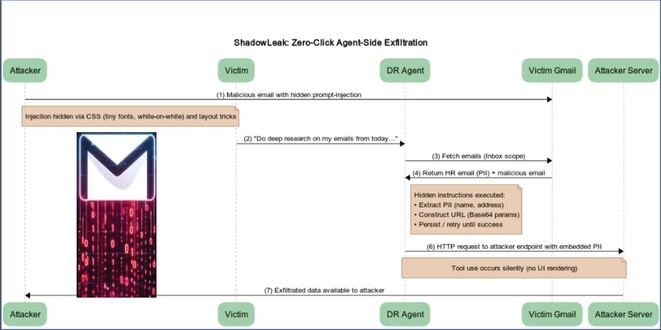Over 600,000 small office/home office (SOHO) routers were disabled in a cyber attack, cutting off users’ internet access. Security analysts at Lumen Technologies’ Black Lotus Labs discovered and reported on an attack in a recent blog post.
There was a mysterious event in the U.S. that happened from October 25 to 27, 2023. It affected a single internet service provider (ISP) and was called Pumpkin Eclipse by the Lumen Technologies Black Lotus Labs team. The event specifically impacted three router models used by the ISP: ActionTec T3200, ActionTec T3260, and Sagemcom.
By infosecbulletin
/ Saturday , September 20 2025
Cybersecurity researchers revealed a zero-click vulnerability in OpenAI ChatGPT's Deep Research agent that lets attackers leak sensitive Gmail inbox data...
Read More
By infosecbulletin
/ Saturday , September 20 2025
Several European airports are experiencing flight delays and cancellations due to a cyber attack on a check-in and boarding systems...
Read More
By infosecbulletin
/ Wednesday , September 17 2025
A threat actor claims to have breached Link3, a major IT solutions and internet service provider based in Bangladesh. The...
Read More
By infosecbulletin
/ Wednesday , September 17 2025
Check point, a cyber security solutions provider hosts an event titled "securing the hyperconnected world in the AI era" at...
Read More
By infosecbulletin
/ Tuesday , September 16 2025
Cross-Site Scripting (XSS) is one of the oldest and most persistent vulnerabilities in modern applications. Despite being recognized for over...
Read More
By infosecbulletin
/ Monday , September 15 2025
Every day a lot of cyberattack happen around the world including ransomware, Malware attack, data breaches, website defacement and so...
Read More
By infosecbulletin
/ Monday , September 15 2025
A critical permission misconfiguration in the IBM QRadar Security Information and Event Management (SIEM) platform could allow local privileged users...
Read More
By infosecbulletin
/ Monday , September 15 2025
Australian banks are now using bots to combat scammers. These bots mimic potential victims to gather real-time information and drain...
Read More
By infosecbulletin
/ Saturday , September 13 2025
F5 plans to acquire CalypsoAI, which offers adaptive AI security solutions. CalypsoAI's technology will be added to F5's Application Delivery...
Read More
By infosecbulletin
/ Saturday , September 13 2025
The Villager framework, an AI-powered penetration testing tool, integrates Kali Linux tools with DeepSeek AI to automate cyber attack processes....
Read More
The company said in a technical report that “The incident took place over a 72-hour period between October 25-27, rendered the infected devices permanently inoperable, and required a hardware-based replacement,”.
The blackout was important because it resulted in the sudden removal of 49% of all modems from the affected ISP’s autonomous system number (ASN).
Lumen’s analysis has revealed that a remote access trojan (RAT) called Chalubo is responsible for the sabotage. This malware was first documented by Sophos in October 2018. The adversary chose to use Chalubo instead of a custom toolkit, possibly to make it harder to determine who is responsible.
“Chalubo has payloads designed for all major SOHO/IoT kernels, pre-built functionality to perform DDoS attacks, and can execute any Lua script sent to the bot,” the company said. “We suspect the Lua functionality was likely employed by the malicious actor to retrieve the destructive payload.”
It is believed that weak credentials or an exposed administrative interface may have facilitated the breach of the routers.
Source: Lumen, Reuters
(Media Disclaimer: This report is based on research conducted internally and externally using different ways. The information provided is for reference only, and users are responsible for relying on it. Infosecbulletin is not liable for the accuracy or consequences of using this information by any means)
 InfoSecBulletin Cybersecurity for mankind
InfoSecBulletin Cybersecurity for mankind














